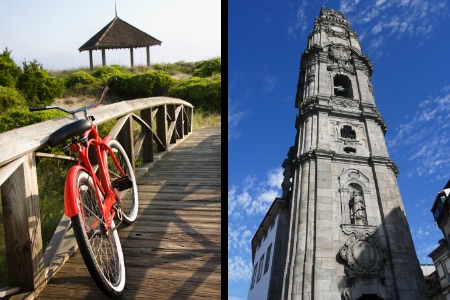Winter Vacation

Winter Vacation
Akane and Howard talk about their winter vacations.
Akane's Vacation
Last year, I went to Portugal just after Christmas. And I stayed there until… well, just after New Year's this year. In Portugal, I met up with one of my friends from Toronto. He had family that lived in Portugal, because his family was originally from Portugal.
So, they were kind enough to let me stay with them. I didn’t know any Portuguese, except for some simple words like “hello”, and “thank you”. I learned some simple words through an audio CD, before I went there. And the people that I stayed with didn’t know very much English either. However, we got along surprisingly well.
They were surprised that I was able to eat some of their exotic foods. They made some delicious meals every single day, like octopus, tripe and rabbit. It is quite exotic, but I thought it was quite good. They also made some excellent desserts, like crème caramel, and a rich sponge cake that they call Paon d’lo.
Howard's Vacation
OK, now I'll talk about my winter vacation. This winter vacation I spent two weeks in my hometown which is Daytona Beach, Florida. It was wonderful. The weather was warm every day. It was sunny every day and the temperature was almost 80 degrees.
I visited my mother and I spent every morning having a nice leisurely cup of coffee and reading the newspaper and after that I got my bicycle out and and rode down to the beach and enjoyed the sun and the surf, and came back home and read a book and went to bed early.
I had a wonderful time. I saw a couple of new movies, when I was home in Florida. I saw The Aviator and also an interesting movie called Spanglish, which I hope you all can see because it's an interesting movie about English and the Spanish.
Past Tense - Irregular
- I was late to the party. (be)
- There were happy to see you. (be)
- She made a lot of money on that deal. (make)
- We drove to the beach. (drive)
- I was at home yesterday. I wasn't at work.
- It was a fun party. It wasn't boring at all.
- He was sad all day. He wasn't happy.
- She was a good teacher. She wasn't strict.
- You were right. You weren't wrong.
- They were late. There weren't on time.
- We were happy with the food. We weren't disappointed.
- You all were so noisy. You weren't very quiet!
- I saw a ghost, but I did not see it for very long!
- I ate a light breakfast. I did not eat eggs or toast.
- I saw Bill at the party. I did not see Sue.
- I bought a new car. I did not buy it for me though.











